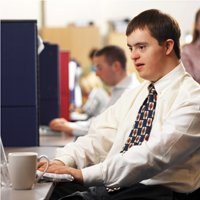|
|
|
Transition Process
Like other transitions in life, Health Transition is a process, not a one-time event. The earlier teen, young adults and their families start getting ready, the smoother the Health  Transition process will go. Points to keep in mind: Transition process will go. Points to keep in mind:
- Start early to build skills. Self-advocacy skills are important in health, just as in other parts of life. Knowing about the disability or health condition and how to care for one’s self can begin very early.
- Aim for independence. It may be hard for parents to imagine their child’s independence at first, but becoming independent is a step-by-step process and won’t happen on its own. Independence is also a lot of work and the young person may feel more comfortable letting others be responsible. But parents won’t always be around. Young adults who have been prepared to advocate for their needs and make their own decisions have more control over their quality of life.
- Health care providers are key. Health care providers should include a primary medical care provider and a primary dental care provider. These primary providers may also qualify as a medical and dental home. Depending on the needs of the young person, there may also be one or more specialty care providers. Ideally, each new provider will be knowledgeable about the young person’s health condition or disability and its treatment, and will be someone with whom the young person feels comfortable. It is also important to find providers who accept whatever insurance coverage the person has. Finding providers who meet all these needs may be challenging.
- Learn the system. The adult health care system is often very different from the pediatric system. The patient is expected to take more responsibility and there is less support from staff. It can feel very lonely in the adult system for a young person who has not been prepared for the different approach to services and the many unfamiliar faces.
|
|
|

